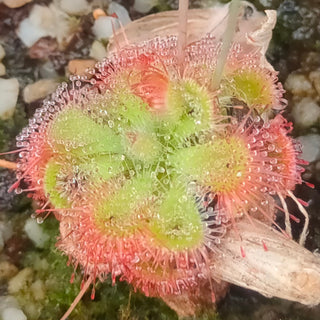Dodecatheon clevelandii
NATIVE PADRE'S SHOOTING STAR
- Unit price
- / per
Primula clevelandii, with the common name of Padre's shooting star, is a species of primrose. The plant is native to California and Baja California. It is generally found in open grassland areas. Primula clevelandii is spring deciduous perennial with basal clumps of leaves up to 40 centimeters long. The flowers are magenta to deep lavender to white. They are nodding flowers each about an inch long on stems up to a foot tall.
Type: Hardy perennial
Height: 35cm, 14"
Location: Sun or shade
Hardiness zones: 4-8
Seeds per packet: 10
Surface sow as light aids germination. Water the seeds in. Temperature 20-22C (68-72F) for 4 weeks. If they have not germinated after 4 weeks then a cooling period is required. Cover them with plastic and place in a fridge for 4 weeks. Be sure they stay moist. After the cold stratification period they are then brought back to a cool room (15C, 59F) for them to germinate. Germination can be 30-60 days after the warming period, though some will take longer.
Dodecatheon clevelandii
NATIVE PADRE'S SHOOTING STAR
- Unit price
- / per
Multiple secure payment options available.
Adding product to your cart
You may also like
Primula clevelandii, with the common name of Padre's shooting star, is a species of primrose. The plant is native to California and Baja California. It is generally found in open grassland areas. Primula clevelandii is spring deciduous perennial with basal clumps of leaves up to 40 centimeters long. The flowers are magenta to deep lavender to white. They are nodding flowers each about an inch long on stems up to a foot tall.
Type: Hardy perennial
Height: 35cm, 14"
Location: Sun or shade
Hardiness zones: 4-8
Seeds per packet: 10
Surface sow as light aids germination. Water the seeds in. Temperature 20-22C (68-72F) for 4 weeks. If they have not germinated after 4 weeks then a cooling period is required. Cover them with plastic and place in a fridge for 4 weeks. Be sure they stay moist. After the cold stratification period they are then brought back to a cool room (15C, 59F) for them to germinate. Germination can be 30-60 days after the warming period, though some will take longer.
















































